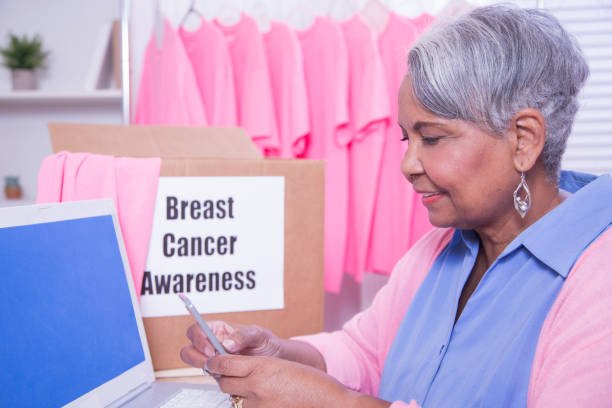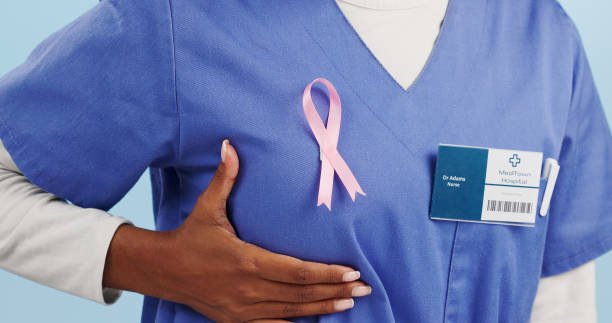From diagnosis to survivorship, every stage of a breast cancer journey can bring its own set of difficulties. A strong network of support may lessen the load and give you the fortitude and resiliency you need to go on.

Support can be physical, monetary, mental, or emotional. It can be given by many people; the list includes doctors and nurses, family and neighbors, local and national organizations, and support groups.
Why Finding Support Is Important
Breast cancer diagnosis, treatment, and survivorship is a life-changing, complex, and often isolating journey. The disease itself and treatment can have a negative impact on almost every area of life, including:
- Money
- Body image
- Memory
- Sexual relationships
- Family dynamics
- Bone health
- Mental health, such as depression, anxiety, stress, post-traumatic stress disorder (PTSD)
Those with breast cancer may stop taking care of themselves or even refuse treatment because of cancer-related fatigue, stress, depression, or anxiety.
Having a strong social support network can help you in all the challenges that you encounter in breast cancer, will give you a feeling of security, and reduce the feelings of isolation and depression. In other words, the benefits lead to improved survival and prognosis.8 Support is essential at all stages of recovery-from long-term treatment (for example, hormone repression therapy)-to survivorship. Emotional triggers may last throughout survivorship and could be delayed until after you have survived the fight of treatment.
Support Services for People With Breast Cancer
The following are ideas and resources for emotional, mental, financial, and practical support for people with breast cancer.
Services For Emotional Support
The fight with breast cancer can arouse many emotions that are hard to handle alone.
Some national organizations also offer emotional support services, such as the American Cancer Society (ACS). In fact, the ACS offers Reach To Recovery, a free resource in which you may connect with a volunteer who is also a breast cancer survivor. Volunteers answer questions, teach coping mechanisms, and help you find resources.

In-person and online support groups are another source of emotional support. They make it possible to share experiences, feelings, and practical advice in a place that is safe. Support groups are available from a list of organizations or services that offer cancer support, by the National Cancer Institute.
Other professional mental health therapists or counselors can help by providing:
- Priviledge place to share feelings.
- Guide clients in making the best possible decisions
- Mentoring toward healthy coping.
- Psychologic Interventions that address secondary to the treatment effects of cancers, such as hypnotherapy.
- Trauma-focussed therapy like the eye movement desensitization and reprocessing technique.
- Couples and/or family therapy.
- Sex therapies
Professional counseling can normally be accessed in private settings, cancer centers, as well as in hospitals.
Online Counseling Options
If you prefer online therapy, some more affordable options include:
- Brightside
- Amwell
- Online-Therapy.com
- Talkiatry
- Talkspace
- BetterHelp
- Open Path Collective (directory for online therapy services)
Services For Financial Support
Financial support for those in need might include:
- Patient service programs: Most hospitals, especially cancer centers, have patient service offices to assist with expenses such as prescriptions and utilities.
- Cancer support homes: There are local and national cancer support homes, such as the Reynolds Cancer Support House, that offer services such as financial assistance, nutritional support, salon services, and hair coverings or prosthetics.
- Sliding scales: Some hospitals offer sliding scales based on income.
- Government aids programs: This may cover the Medicaid program, state-based programs, or government assisted housing
Practical Support
Access to accurate information from healthcare providers or reputable sources is one form of practical support. It is helpful to understand, as a patient, the treatment plan, what happens in procedures, and what is expected.
Practical support also involves help with day-to-day activities, medical care, or anything else that lightens a burden. Such support can come from friends, family, community members, or organizations and may include:
- Food preparation or meals
- Household chores
- Child care
- Rides to treatment
Cleaning for a Reason partners with residential cleaning companies in the U.S. and Canada to clean homes of those with cancer, bringing hope, relief, and cleanliness.
How do you find support?
Typically, finding support calls for research and contact with available resources and organizations. Some avenues that might assist you or someone close to you are: Healthcare providers and facilities
Healthcare providers often have knowledge about local resources
. Nurse navigators (a nurse who works with the cancer team or center), social workers, case managers, and oncology (cancer) providers are a good place to start.
City of Hope. They usually have available integrative care: nutrition, stress reduction, and complimentary treatment, along with survivorship care besides the medical care.
- Community clinics
- Cancer support homes
- Local hospitals
- Local public transit agency
- Church or community groups
Support Events
Contact your local hospitals, community centers, community groups, schools, and cancer organizations like Susan G. Komen to learn about available support events, workshops, and seminars. These often are good sources of getting connected with other people, learning about the services provided and where to access them.
Internet Searches and National Organizations
You can find reputable, professional organizations like the American Cancer Society (ACS) online. Professional organizations offer education, resources, databases, or a list of local and national resources. Many of these resources are free or have a minimal cost for those with financial need
- 24/7 Cancer Helpline: Connects you with trained information specialists who can answer your questions and locate resources in over 200 languages. Call 1-800-227-2345 or schedule a video chat.
- Hope Lodge: If your city has one, then you’ll enjoy a free place to stay during your treatment, and that is great because it’s going to help you take your focus on getting well with connecting to others facing that same journey.
- Extended Stay America: Alternative to free accommodation for people in areas not served by a Hope Lodge. To access this service you call 1-800-227-2345.
- ACS CARES: ACS CARES helps you locate tailored content, programs, and services.
- TLC: Can help assist with providing education about wigs, headwear, and mastectomy items.
- Road to Recovery: Can assist with organizing an individual’s ride to a cancer treatment.
American Cancer Society Database for Local Resources
The ACS can link you to a database where you can search by zip code or resource type. You can zero in on specific resources such as “co-pay, lodging, mortgage, ride, gas, utilities, wig, or prosthesis.”.
Other good organizations are:
- National Cancer Institute
- National Library of Medicine
- Cancer.net
- Cancercare.org
- National Breast Cancer Coalition
- SHARE Cancer Network
- Mercy Medical Angels (transportation assistance)
- Needy Meds (travel and dental care expenses)
- WhyHunger (database of community-based organizations that help with food costs)
- Meals on Wheels (can also call 1-888-998-6325)
- Temporary Assistance for Needy Families (TANF)
If you do not have internet access, check with your public library, as they most likely offer it at no cost.
Online Forums, Groups, or Discussion Boards
There are many online forms providing breast cancer support on the internet. One example is the public discussion board of the ACS Cancer Survivors Network.
Virtual communities help you connect with people worldwide to share information and emotional support. Some meet online while others meet through a conference call on the phone.
There is usually a small fee or no cost for support groups. Some people like the ease of online support groups and the anonymity with which one can participate in online support groups. This helps those who cannot join groups in-person or those that prefer less privacy.
There are some groups specifically for demographics. Metavivor, Metastatic Breast Cancer Network (MBCN), and Cancer.net’s metastatic breast cancer section are metastatic breast cancer support groups.
Demographic-Specific Support Groups
Other demographic-specific support groups are:
• Cancer Survivors Network: For different types of cancer
- Touch, the Black Breast Cancer Alliance: For members from the Black community
- Young Survival Coalition: All ages 40 or less with breast cancer
- Stupid Cancer: for ages 15 to 39 with any type of cancer
- Intercultural Cancer Council: Those in the racial and ethnic minorities, as well as medically under-served populations
- Sisters Network, Inc: Explores breast cancer effects in the Black community
- ALAS-Wings: Hispanic/Latina women who have been diagnosed with breast cancer
- American Indian Cancer Foundation’s Breast Cancer Stories: For American Indian patients
- Male Breast Cancer Coalition: Support and resources for men living with breast cancer
Support groups specifically for mental health:
How to Support Someone With Breast Cancer
Although the ways through which you can support your loved one with breast cancer will vary based on the closeness of your relationship, here are some suggestions:
- Checking in: Your loved one may not always be up for a visit, but a quick check-in lets them know they have your support.
- You can also consider sending notes or small gifts to brighten their day.
- Emotional support: Sometimes, just listening is the best thing you can do.
- Practical support: This could include rides, childcare, household chores, errands, reminding you of appointments, or helping arrange meals.
- Medical appointments: It is often helpful to have someone with you at medical appointments. A second pair of ears can help you remember what providers discuss in terms of prognosis, medications, treatment, and side effects.
- Assist with caregiving: Depending on your relationship, you may be able to help with various aspects of medical care or daily tasks such as getting dressed, eating, or going to the restroom.
- Help find support services: It is overwhelming to look for support while trying to undergo treatment and manage daily activities. Having someone to help you find resources can be a great relief.
- Respect their autonomy: It’s important to respect your loved-ones individual choices. However, it’s ok to ask questions to ensure they understand their options and the potential consequences of their decision.
Start a Support Group
If you want to start a support group, follow these steps:
- Establish the purpose and objective (will it be for people receiving, survivors, caregivers, or all three?)
- Find other groups
- Seek co-organizers
- Pick a location
- Publicize it (flyers, local partners, social media, etc.)
- Develop a structure for the meetings
- Maintain anonymity and confidentiality
- Invite guest speakers
- Prepare for emotional support
- Foster open communication
Quick Review
A strong support system helps the whole journey of breast cancer for all stages.
Support is emotional, which might be drawn from loved ones, a professional organization like Reach to Recovery, support groups, or professional counseling. The available financial resources are wide and varied, ranging from such organizations as Living Beyond Breast Cancer to government programs designed to assist.
Loved ones can help support someone with breast cancer by checking in, providing emotional support, or giving practical help (like grocery shopping or childcare). Anything that helps ease a burden can help your loved one cope.

